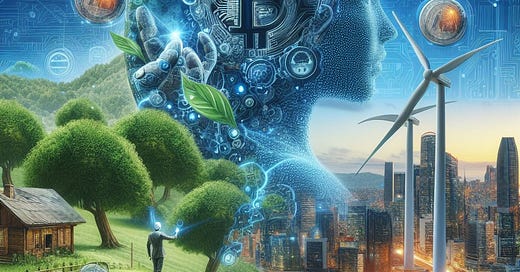Can Capitalism be Improved?
Will AI, Bitcoin and Environmentalism change the world? It's time to take The Sniff Test.
The Business of Democracy
The business of democracy is building coalitions. Even in two party systems there are shifting alliances, forming and reforming around issues. Once in a while the politicians ask the electorate for approval before heading back to the clubs and cabals of the capital.
Voters don’t agree with every stance a party takes. They vote for the one that is agreeable on the issues they care most about. You may be asked how you can vote for a party with that view on immigration, but if you don’t care much for immigration and have a strong view on taxation, that may be why you voted.
Referenda are acute versions of this because they are all or nothing elections. Unlike regular politics where you get a say every few years, there may not be another referendum for decades. This leaves deep scars on society.
Votes about political independence are singular outcomes for multiple issues. The winner is the side that constructs the biggest coalition. If you voted for Brexit some will label you a racist and if you voted against, others may say you’re happy to be governed by the French. Neither issue may matter much to you.
Brexit has not changed much and Covid was more disruptive. It’s less convenient to holiday on the continent and immigration is from outside the EU nowadays, but the people running the world haven’t changed.
And that is because they are very difficult to change.
A Revolutionary Agenda
How do you bring about change on a matter that is of utmost importance? You may try bottom up to change people’s behaviour, or top down by influencing how companies and government work. You may attempt both.
My brother was passionate about environmental issues as a teenager. He may be equally passionate today but we no longer share a house and hence don’t feel his ire and frustration at how hard it is to effect change. He used the mantra that if you are not part of the solution you are part of the problem and railed against the middle classes.
It becomes difficult to differentiate between environmental issues and class warfare. Middle class ecologists become a vehicle for less well-intentioned class warriors. In representative politics we call this a coalition, but in fringe politics it is a protest movement.
If you succeed in making enough noise about something then the government will get involved. Recycling is a low impact way of making a difference and after a few grumbles about what goes in which coloured bin, people feel good about doing it.
There is a spectrum of sustainability-related behaviour running from recycling to gluing yourself to the road and most of us fit somewhere in it. If government moves too fast in one direction then there is a backlash and everything goes on hold. We are in such a moment, with protests over London’s Ultra Low Emission Zone extension and Dutch voters turning away from the creeping green bureaucracy of mainstream parties.
Campaigners get frustrated with the glacial change of public opinion and look to kick it up a level.
Changing Company Behaviour
A second way to bring about change is through the economic system and altering how companies make profits. Initially this effort is bottom-up, attempting to change consumer behaviour with measures such as food labelling and awareness of child labour in the fashion industry.
When this doesn’t go far enough, because we ignore the labels or Gen-Z makes Shein the go-to fast fashion manufacturer, then there are taxes for bad behaviour and subsidies for good. These require lobbying for changes to rules and regulations.
We have subsidies for insulating our houses, digging a heat pump and installing solar panels. But it takes effort and cost and once again is slow moving. Subsidies attract bad actors and there are scams and schemes that slow adoption.
The corporate world has carbon credits, whereby good companies are rewarded with assets that they can sell to bad companies. While some liken this to adulterers paying others to remain faithful, it does create an economic incentive for better behaviour, albeit a slow moving one. The additional costs are pushed down to the consumer.
Changing the Nature of Profits
The sustainability lobby also wants a change in accounting. This takes years of painstaking consensus building and is unlikely to either inspire or satisfy the activists.
The idea behind impact accounting is that companies address externalities, which are costs and benefits other than those for shareholders. If a company pollutes a river then it must account for the cost of clean up, whether the clean up occurs or not, while allowing staff time off for charitable work generates a credit.
This is shadow accounting and it’s nothing new. Companies often restate accounts for investors to portray a different and more flattering view of what is happening. Sometimes it works and the share price goes up, other times it doesn’t.
The problem with environmental accounting is that companies are doing harm. They use up freshwater, dirty the air, dump waste and all of these things have adverse consequences for flora and fauna. Nobody is in a hurry to restate their accounts to make them look worse.
Certain industries make attempts to calculate the benefits they create for society that go beyond profits. Healthcare companies for example want credit for the extra days worked by healthy people and reward for our longer lives.
To date, however, we have not come up with a better way of valuing something than the excess cash generated by selling it. Pharmaceutical companies are already richly rewarded for innovations through patents. It is not clear that inventing cashless profits on top of this will change either company or investor behaviour.
Fast forward 20 years and companies may be accounting for the net carbon they produce, the habitats they endanger and the people they poison. But this only happens if governments require them to pay or receive cash in relation to these activities. There is redress today, most frequently through litigation, but it rarely extends beyond national borders.
Much of the reduced carbon footprint in the West is due to moving polluting industries to other countries. Stopping producing chemicals in gas-fired German production facilities and buying them instead from a coal-powered plant in China or India, is net negative for the environment. But it shows up positively in the carbon accounts of BASF, Germany and the EU.
Expecting China and India to house polluters and use carbon accounting is pointless. If you want change, then invent a natural alternative to the chemicals and a clean way of powering the production plants. Don’t expect those who benefit from the pollution to do the work for you.
The corporate world will only change to the degree that the consumer is accepting of change. Hence attempts to reform how companies operate run into the same issue as trying to change individual’s behaviour. We’ll do it if it makes sense for us and it’s easy, but not if we have to put ourselves out.
The Ministry for the Future
In the novel The Ministry for the Future, the catalyst for the world tackling climate change is a devastating heat wave killing millions in India. But it is terrorist violence that changes global consumer behaviour. In particular, random bombings of airplanes convince people to find alternative ways of travel and doing business.
The story is allegedly hopeful and upbeat and the book is marketed as one of Barack Obama’s favourites. Yet there is an underlying air of menace and threat that if you don’t change your ways, good people will do bad things to you. Your disinterest is causing catastrophe. Reading the book transports me to the dinner table with my brother as a young man.
Once the environmental campaigners have tried and failed to shame the masses into action, and after being snubbed by the corporate establishment, the last option is to rewrite the relationship between state and corporation. At this point the well-meaning environmentalists realise the class warriors were right all along and capitalism must be reinvented.
Our newly radicalised campaigners now face the common problem of the revolutionary. The capitalist system is very good at co-opting the ideas of its enemies and carrying on regardless. The welfare state, retirement income, public health and minimum wages were all at one point going to end capitalism. All are accepted and adopted without a significant change to the social order. In fact, they reinforce the social order by keeping people in their place.
A Lesson from Crypto
Bitcoin was born out of despair with those in power devaluing money and only a few very rich people being able to benefit from the process. It is a shadow finance system outside of the normal order. As it blossoms, the people will see its value and bring more of their assets on chain, undermining the banking system in the process.
This is another bottom-up, consumer revolution and it’s going the same way as the others. Much as we will recycle but not give up eating meat, we’ll use Bitcoin if it makes sense and is not too difficult. But if you want to keep something outside of state control it will be hard to use and in the meantime the bankers are stealing your idea.
The price of bitcoin rallied above $40,000 recently. The irony is while the core belief remains that it protects us from the dollar system, it only works when bitcoin can be traded on the stock exchange. Rather than financial assets migrating to the blockchain beyond the reach of the state, crypto assets become popular by being traded on regulated exchanges. They will be under direct government control.
Carbon Credits Need Carbon
The carbon credit market is booming because financial companies see an opportunity to do more business. Banks and brokerages make money by facilitating the movement of assets, rather than risking making investments. Carbon credits may rise in price to the point where they deter polluting, but the driving force for this will be speculative investment by hedge funds and money managers.
If you’re asking whether this matters, then remember for something to be traded it has to exist. The financial system has a vested interest in carbon being produced so it may be offset. The market for credits is expected to grow to $1.6 trillion by 2028, which means we need more carbon to trade not less.
Technology Benefits the Old Order
As a third example, the rise of artificial intelligence is going to democratise information. But we are already overwhelmed by data and looking around for trusted authorities to interpret it for us. The BBC and New York Times are more influential in the age of digital media because with all the information flying around, we want someone to tell us what to think about it.
Far from freeing the masses to make their own minds up and potentially replacing the electoral system with online referenda, technology reinforces the power of the old order. The big tech companies own the AI because they own the data on which it runs. That battle ended when you signed away your privacy to get access to your iPhone apps.
The attempts to put the genie back in the bottle, most common in Europe, result in people being denied services by Facebook and Google. How long will you go cold turkey on access to the digital world before you tick the box and agree to cookies to get back on TikTok? Once again, it’s too inconvenient for the masses to start a revolution and they don’t.
What’s Better than Capitalism?
The boom in China only happened once it adopted a form of capitalism. For sure there is more state control over business and the balance of power between politicians and CEOs is skewed in favour of the former, when in the west it is the other way around. But progress is measured in profits and economic growth and China uses the same basic system of measurement and management as America does. So too India.
If you want to overthrow capitalism you have to come up with something better. It’s no good pointing out all the things that are wrong because people will ask you what’s your alternative. To date the answers to this question have been pathetic. As a result, capitalism has simply co-opted the minimal amount of reform required to placate the majority of people and carried on regardless.
That’s a feature of the system not a bug. It’s why capitalism persists. Some fret that this is not capitalism as Adam Smith meant it, because it is too controlled by a relatively small group of very rich and powerful people. That misses the point that capitalism is a system for running the world that adapts and changes to remain dominant.
Until you have a better alternative, you won’t change anything.









